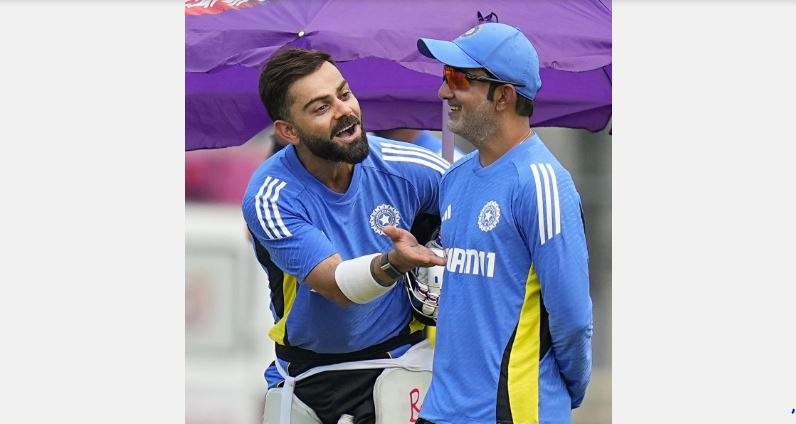New Delhi, September 18 (HS). Indian cricket team head coach Gautam Gambhir has praised Virat Kohli's unwavering commitment to Test cricket as a player and a captain.
“When I was growing up, especially at a time when the T20 format and IPL didn’t exist, first-class cricket was my ultimate goal. We looked forward to making it to the Test team. Playing limited-overs formats was exciting, but we always believed we would be judged on our performance in red-ball cricket. The legacy you leave behind in the game is deeply linked to how well you perform in Test cricket. You played a huge role by telling me how important Test cricket is to you,” Gambhir said during a conversation with Kohli in a video shared by BCCI TV.
Kohli stepped down as captain of India's Test team in 2022, a day before India lost the Test series 2-1 to South Africa in Cape Town.
Kohli took over as the full-time Test captain when MS Dhoni announced his retirement in Australia in early 2015 and went on to become India's most successful Test captain ever. Kohli's tenure as Test captain was largely successful, as he led the team to No. 1 in the ICC rankings and several memorable overseas victories. In 2021, he led India to the final of the inaugural World Test Championship in Southampton.
Recalling his time as Test captain, Kohli said, “When I got the opportunity to play the role of captain, the challenge of moving from the old team to the new team was exciting. I remember I was only 25 years old and was leading a group of players who were in their twenties. My focus was on how to build a team that could become famous everywhere like the generation before us.”
He said, “I knew it couldn’t happen by chance – it needed careful planning. I started thinking about where Indian cricket should be in seven years and that’s where the solution came from. We needed a strong group of fast bowlers and batsmen who could hold the innings together and the responsibility had to be shared between five main batsmen and a wicketkeeper who could consistently get us 350-400 runs. We couldn’t depend on a seventh batsman for cushioning. All these ideas came together and I communicated them to the team accordingly.”
Gambhir said the challenge in today's world is to inspire the next generation to think the same way, to give as much importance to Test cricket as the current generation of Indian cricketers does.
“If we can inspire them to see Test cricket as the pinnacle, then Indian cricket will remain strong. I firmly believe that the stronger your Test team is, the stronger your overall cricketers will be,” Gambhir said.
Gambhir also said that Kohli stressed on creating a pool of quality fast bowlers, due to which India won many times at home and abroad.
He said, “The great thing you did was to build a very strong bowling unit. In Test cricket, unless you have a lineup capable of taking 20 wickets, you cannot win consistently. This is what makes you the most successful Test captain of the country. Credit goes to you, because it is easy to have six or seven strong batsmen to put runs on the board, but the way you identified and, most importantly, showed the right attitude on the field, especially with the fast bowlers, was remarkable. Imagine having bowlers like Mohammed Shami, Jasprit Bumrah, Ishant Sharma and Umesh Yadav and winning overseas matches with them.”
On the 2014–15 tour of Australia, with a target of 364 on the last day of the Adelaide Test, Kohli hit a hundred, his second of the match, while India lost by 48 runs. This was his first Test.
Recalling that match, Gambhir said, “Despite the challenge, you were determined to win that Test match. That is the mindset we are talking about, and that is the culture we want to carry forward – a culture where players are eager to play Test cricket. If you want to assess someone’s personality or character then Test cricket is the best format. It tells everything about a player. To succeed in Test cricket, you don’t just need to be the most skilful; you need much more than that.”
“You need discipline, patience, fight, compassion, emotion and even empathy because after fighting for five days you don't know if you will get the result or not,” Gambhir said.
Gambhir said India's success in the Test format in the coming years will depend on the team's ability to retain a series of quality fast bowlers.
He said, “When we talk about having a strong red-ball team, a lot will depend on the next generation of bowlers. We will keep getting quality batsmen, as the structure of Indian cricket constantly produces them, but the real challenge is whether the younger generation of bowlers have the motivation to bowl 20 overs and take wickets.”
 look news india
look news india

